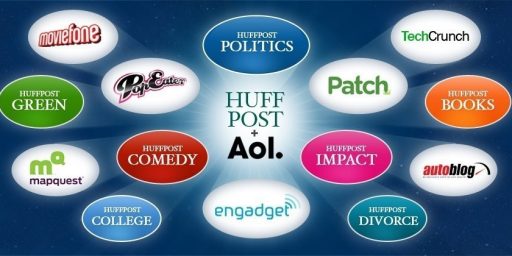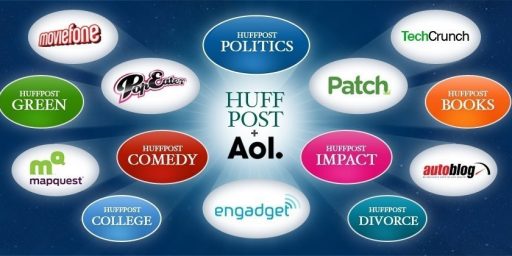Howard Fineman to HuffPo
In yet another sign of how rapidly the media landscape is changing, longtime Newsweek stalwart is leaving for the Huffington Post.
The juxtaposition of two stories at Mediagazer this morning is somewhat amusing. First, the NYT blog report “Newsweek’s Howard Fineman to Join The Huffington Post.”
Howard Fineman, one of the more recognizable pundits on cable television and a correspondent for Newsweek for 30 years, is leaving the magazine to become a senior editor at The Huffington Post.
Mr. Fineman’s move from a print medium to online news is a sign that The Huffington Post, which has until now heavily relied on young bloggers, is maturing. And it signals that the site, which has become one of the largest news destinations on the Web since it started in 2005, is investing significantly in its growth.
“From the day we launched, it was our belief that the mission of The Huffington Post should be to bring together the best of the old and the best of the new,” said Arianna Huffington, the site’s co-founder. “Bringing in the best of the old involved more money than we had when we launched. But now that our Web site is growing, we’re able to bring in the best of the old.”
Mr. Fineman said that an online platform afforded him new opportunities. “It really wasn’t a difficult decision at all once I really began to think about it because this is where the action is,” he said. “The chance to dive headlong into the future is one that I don’t think anyone could pass up.”
Mr. Fineman will become senior politics editor, helping to direct and shape The Huffington Post’s political coverage from its Washington bureau. He will begin the new position next month. He will remain an analyst for MSNBC, the cable news channel, but will discontinue his column for MSNBC.com.
Contrast this with Frédéric Filloux‘s “Aggregators: the good ones vs. the looters.” The former category is exemplified by Mediagazer and its sisters in the Gabe Riviera empire, Techmeme and Memeorandum, which provide valuable links for content providers without taking away their readers. The latter? If you guessed HuffPo, you’re right.
Here are the Huffington Post’s “principles”:
– Take an original story available on the internet, preferably outside a paywall.
– Match the subject of the story against a traffic analysis of what readers like on your superblog.
– Process the story according a compression ratio of 15% to 30% (sometimes more); stay as much as possible within an elastic interpretation of “fair use.”- The result of your editorial meat-processing must absolutely be a self-sufficient entity.
– Always quote and link generously; your fairness and integrity must be unquestionable; linking is no big deal since no one will actually click and go to the original source (your treatment should be designed to prevent going back to the originl content).
– You get it: the reader has to stay in the environment of the Huffington Post, in which he will comment, babble profusely, (I spotted a 12,000 comments on a copyright free video); he will Facebook-share the “piece”, creating further reverberation the HuffPo machine will sell to is advertisers. Comprende?
The original content provider gets screwed? How come a story that cost the original publisher $10,000 or $30,000 to report, edit and produce gets transformed into a mere one-gulp self-sufficient capsule? That’s the internet, baby. If the publisher doesn’t want his stuff to be e-looted, he should put it behind a paywall, or into a smartphone application. (Which is exactly what needs to happen in order to avoid certain death). This is the type of intellectual construct that evokes wet dreams of Gallic HuffPo clones into the mind of people with the journalistic culture of a mollusk.
I’ve long thought that HuffPo was basically a soft porn site and content scraper — those are the things that generate the lion’s share of the site’s traffic and which cost next to nothing to produce — masquerading as a political magazine, which is both more prestigious and generates higher advertising rates. At the same time, however, they continue to add high profile reporters like Sam Stein, Dan Froomkin, and Fineman. So, either they’re investing a lot of money in keeping up appearances or they’re striving to turn their business model on its head, using the revenue generated from the crap to turn themselves into what they’re pretending to be.
It helps, of course, that the publishing environment Filloux describes is killing venerable brands like Newsweek and forcing the likes of the Washington Post to become more like the Huffington Post, responding to a news cycle that operates at Twitter speed and in which the lines between hard news and fluff are increasingly blurred. At this point, HuffPo probably looks more impressive on the business card than Newsweek, not to mention giving Fineman (who graduated high school in 1966) so street cred with the Facebook Generation.






